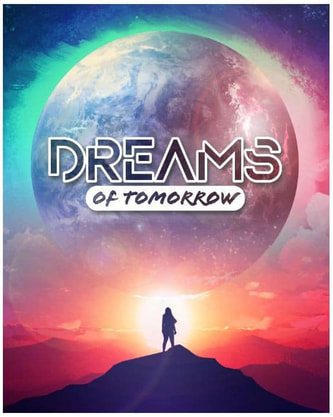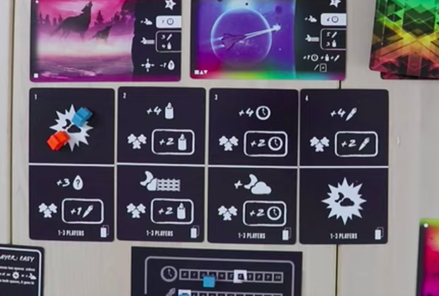 Full Disclosure: I previewed this game while it was on Kickstarter, but I backed the project and bought my final copy of the game with my own money. What is this game about? Dreams of Tomorrow is a tableau-building game in which you are a dream engineer. The idea is that you are living in a future that is pretty bleak, so you're sending dreams back into the past to encourage people to make different decisions and improve the outcome for humanity in the future. The way you'll ultimately do this is to catch dreams and weave them together into the most compelling sequence possible. The first player to weave five dreams together triggers the end of the game, and the player with the highest score will win. There are two ways to score for dreams in Dreams of Tomorrow. The first is just the point value of the dreams in your sequence—some dreams cost more resources to weave, but are also worth more points. The second way is through resonance. The top and bottom of each dream card will contain one or more symbols, and if you manage to line up multiple symbols across multiple dreams, you create resonance. More resonance thematically means that your dreams are more coherent and more likely to inspire the recipient to act. In game turns, more resonance means more points. To catch dreams, to weave them, to collect resources, and to take special actions, players will move around a rondel. You can move up to three spaces for free, and up to six if you pay resources. But what is most interesting is that the rondel can be manipulated. Want to make a move easier for yourself or harder for someone else? Good! The cards that make up the rondel can be rearranged or flipped based on the actions available to you. Dreams themselves are worth more than just points, and if they are not woven into the middle of a dream sequence, you can use them for special actions. How does it play solo? As with any game developed and published by Carla Kopp, Dreams of Tomorrow comes with a solo bot—in fact, three levels of solo bots so that you can increase the difficulty of your game. When you play against the AI, your opponent does move around and manipulate the rondel, which means you get to fully enjoy the most exciting part of the game. However, the AI will not score points the way you do—instead, it will score for the number of turns it takes. This forces you to play very efficiently, weave some good dreams together, and bring the game to an end before the AI's turn count gets completely out of control.  The rondel is made up of cards, which you can manipulate throughout the game. The rondel is made up of cards, which you can manipulate throughout the game. Overall Thoughts Dreams of Tomorrow is a mostly typical tableau building game with one very interesting design element: the rondel. Being dependent on the rondel to get your actions completed in the game, combined with the fun of manipulating it using special actions, really gives Dreams of Tomorrow some zing. I also appreciate the multiple levels of solo difficulty, and the addition of the Night Mare, a mini-expansion that brings added chaos to the game and that can be used in both solo and multiplayer games. When I think about Dreams of Tomorrow, the first thing I think of is that rondel. As usual for a game from Weird Giraffe, I also like the streamlined AI turns. Carla Kopp is excellent at making a bot opponent difficult, but not too much of a burden on you in terms of upkeep. I also have a few quibbles with Dreams of Tomorrow. I am not entirely won over by the theme—"dream engineer" sounds potentially interesting, but it doesn't really come through in the gameplay, and is ultimately too abstract. As is typical of Weird Giraffe games, you should also expect Dreams of Tomorrow to be interesting, but not necessarily tense. Resources are easy to get, and you will rarely feel desperate or worried that you won't get something done within the game. You'll still have to play smart to win, but the game doesn't feel particularly dramatic, so be aware of that if you are considering Dreams of Tomorrow for your collection. Do I recommend it? Possibly. Dreams of Tomorrow is a pleasant, light game with a cool rondel and an easy-to-operate solo opponent. If that's what you're looking for, then this one may be a good fit for you. Overall Rating: 3.5 stars Rating scale: 5 stars — I love it! 4 stars — I really like it. 3 stars — I like it. 2 stars — It's okay. 1 star — Meh.
0 Comments
Your comment will be posted after it is approved.
Leave a Reply. |
AuthorMy name is Liz Davidson, and I play solo board games. A lot of solo board games... Archives
August 2021
Categories
All
|
 RSS Feed
RSS Feed